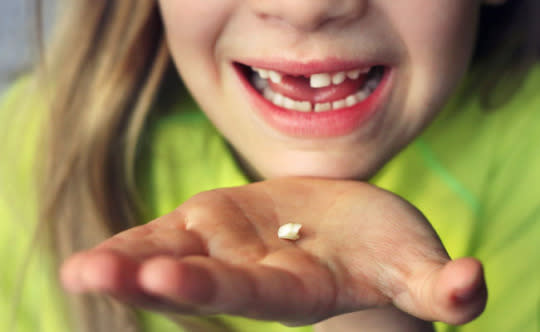The Life-Saving Reason to Save Baby Teeth

If scientists have their way, the tooth fairy will soon be working overtime.
Over the last two decades, parents have been paying thousands of dollars to bank newborn cord blood stem cells as a way to potentially treat diseases that may surface when a child gets older or for close family members with serious illnesses. It’s rare that they’re used, and they are considered more of an insurance policy. But now another, less controversial option is growing in popularity for families: banking baby teeth.
A decade ago, a doctor discovered that baby teeth contain similar stem cells to cord blood that could potentially cure diseases or grow replacement tissue and bones in the body, but it’s taken researchers years to figure out just how exactly these stem cells could be used.
More from The Bump: 4 Cord Blood Myths — Busted
The answer might be in finding a cure for Type 1 diabetes (formerly known as juvenile diabetes). The disease affects more than 1.25 million Americans, although statistics say there’s likely an additional 8.1 million who are undiagnosed.
“We don’t have treatment for certain things today, but that doesn’t mean we won’t have them tomorrow,” pediatric dentist Dr. Jesse Witkoff tells CBS 4 Denver.
As scientists have done more research involving the potential use for the stem cells found in baby teeth, storage facilities have opened to house these samples and laboratories have created kits to help parents preserve their children’s baby teeth as soon as they fall out.
More from The Bump: Baby Milestones: What Baby Will Do When
Take 9 year old Alex Hess, of Lakewood, Colorado, who was diagnosed with Type 1 diabetes at age 4. Having missed the opportunity to bank cord blood, his parents’ research led them to a company called Store-A-Tooth. This organization, along with another 20 or so similar ones across the US that have opened in the last decade, partners with dentists to overnight temperature-controlled kits back to their labs to extract the stem cells from teeth, freeze them and cryopreserve them.
The cost is steep, around the same price as cord blood banking, with initial costs from $849 to $1,749 and annual fees of $120, but for some parents, it’s nice to have the option.
“When they do get the cure, you certainly want to be able to partake in that,” John Hess, Alex’s father tells CBS 4. —Cassie Kreitner
(Photo: Getty Images)
More from The Bump:
Baby’s Cells Stay With You—And Change You—For Life
How To Get The Help You Want When Baby Comes Home
